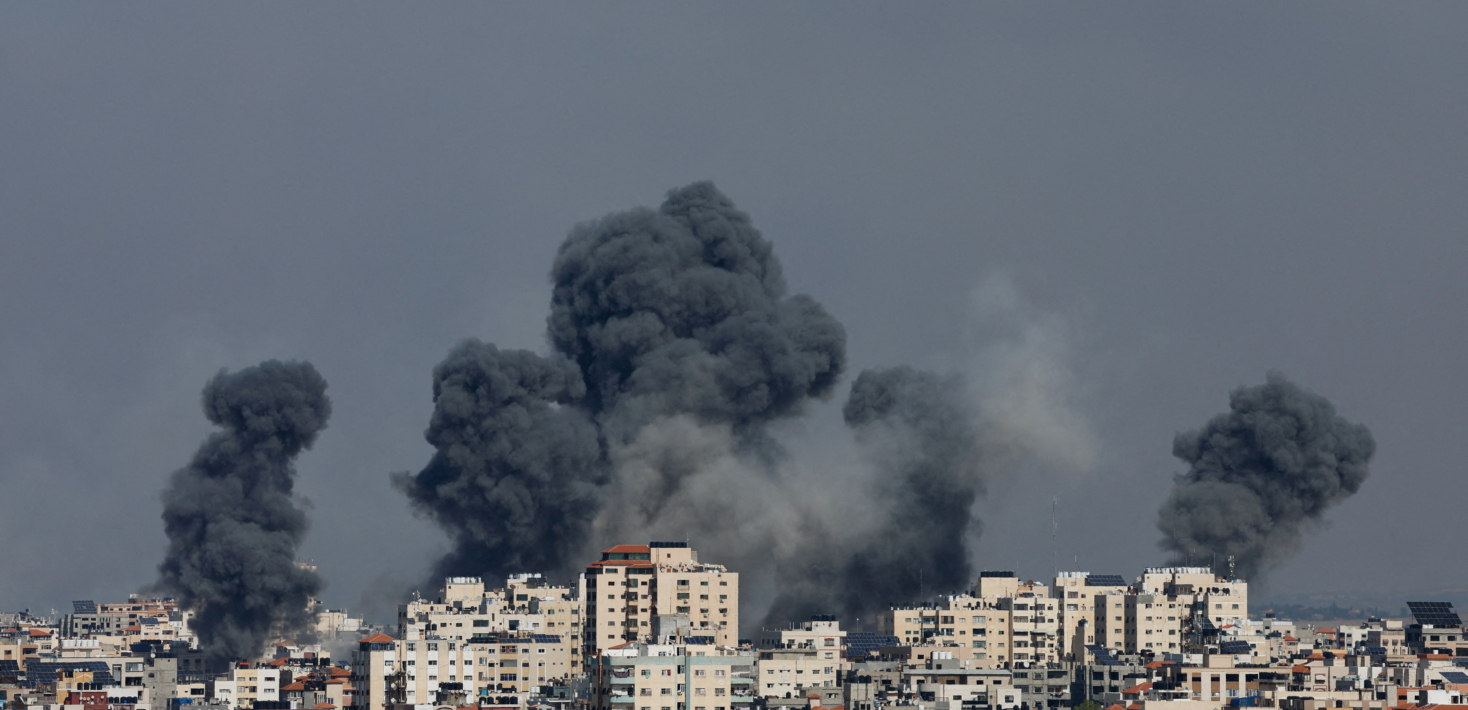On perhaps one of the deadliest nights of the current Israeli-Palestinian conflict, Israeli airstrikes hit the Gaza Strip on Sunday, 22 October, claiming the lives of over 60 people, according to a Hamas spokesperson. Palestinian officials have reported over 400 deaths within the last 24 hours.
To date, 5,000 Palestinians have been killed and 15,275 wounded, according to the Palestinian Health Ministry.
The Palestinian Red Crescent Society (PRCS) released footage on X, formerly known as Twitter, showing what they claim are Israeli airstrikes near Gaza’s Al Quds hospital during a visit by an International Committee of the Red Cross delegation. The PRCS raised concerns about targeting medical facilities in light of the recent bombing of Al Ahli Arab Hospital.
October 22nd- a video showing Israeli airstrikes in the vicinity of Al_Quds hospital while a delegation from the ICRC was visiting. These bombardments caused fear and panic among internally displaced civilians and the medical staff at the hospital.
#Gaza #NotATarget pic.twitter.com/AN6xu6YzMX— PRCS (@PalestineRCS) October 22, 2023
Rushdi Abualouf, a Gaza resident, told the BBC that approximately 60 airstrikes were launched near Khan Younis, a designated safe area. Abualouf highlighted that the director of Al Quds Hospital received a call from Israeli intelligence, urgently advising the evacuation of the hospital, which houses 500 patients in addition to 1,500 people seeking refuge within its walls.
The UN agency for Palestine refugees (UNRWA) warned that Gaza’s fuel reserves will be depleted in three days, threatening humanitarian efforts in Gaza.
At Al Shifa Hospital, premature babies face the risk of death as fuel reserves in Gaza run out.
Dr. Fouad Al Bulbul, head of the neonatal department unit at Al-Shifa Hospital, said in a video published by the Palestinian Ministry of Health that the hospital has run out of medical supplies, putting Al Shifa Hospital’s nursery, which has 45 incubators housing preterm babies, at risk.
The medical unit is grappling with an overwhelming caseload, with the majority of infants in critical condition. Al Bulbui revealed that his team has worked tirelessly for 18 consecutive days.
Though aid starts to reach Gaza, bringing some relief, the humanitarian crisis persists. According to the United Nations, further assistance is urgently needed to address the growing needs of Gaza’s population.
A total of 20 aid vehicles arrived in Gaza on Saturday, 21 October, marking the first humanitarian relief effort in the region since Israel imposed a total siege on the enclave two weeks prior. On Sunday, 22 October, a supplementary humanitarian convoy comprising 14 vehicles was granted access to Gaza, as confirmed by Martin Griffiths, the under-secretary-general for humanitarian affairs at the United Nations.
The AFP reported that a third humanitarian aid convoy entered Gaza on Monday, 23 October, through the Rafah crossing.
However, aid workers stressed the urgent need for a substantially increased influx of aid to address the deepening humanitarian crisis in Gaza. The convoy on Saturday delivered less than four percent of the daily imports required before the conflict began, a meager contribution in light of the 13 days of complete siege.

In the occupied West Bank, Israeli raids on Palestinians continued, resulting in dozens of arrests, including 59 people in Hebron and 40 workers from Gaza.
Shell fragments from an Israeli tank hit the Egyptian side of the Gaza-Egypt border on late Sunday, 22 October, injuring at least seven Egyptian military personnel.
The Israeli military announced that the incident was not intentional, expressing its regrets and vowing to initiate an investigation into the matter.
Egypt’s military spokesperson confirmed that the shell fragments resulted in minor injuries to some of the border monitoring personnel, pointing out that the Israeli side apologized for the accident as soon as it occurred and that an investigation into the matter is currently being conducted.
US authorities are reportedly advising Israel to postpone its scheduled ground incursion into Gaza to facilitate additional negotiations to release American hostages.
As per The New York Times, officials in the Biden administration are seeking extra time to ready themselves for potential assaults on US interests in the area by Iran-backed factions that are anticipated to retaliate if a ground invasion occurs.
Additionally, the report reveals how numerous Western nations with citizens held hostage are allegedly exerting pressure on Israel to defer any prospective land-based military action until they can evacuate their nationals from Gaza.
The Conflict So Far
After a surprise attack conducted on 7 October by Hamas on a number of southern Israeli towns which resulted in the deaths of an estimated 1,200 people and more than 200 being taken ‘hostage’ by Hamas, Israel launched a retaliatory bombing campaign against what it describes as ‘terrorist targets’ in the Gaza Strip.
So far, more than 5,000 Palestinians have been killed in the Gaza Strip — over 1,000 of them children — and 15,273 others injured. Meanwhile 91 Palestinians have been killed in the West Bank and 1,250 have been injured.
The priority of the Egyptian government since the beginning of the conflict has been deescalation and the securing of a path for aid to enter the Gaza Strip through the Rafah crossing. Israel bombed the crossing at least four times, and three aid conveys have crossed to Gaza so far.
Most Western countries, with the United States at the forefront, have expressed unconditional support for Israel, despite the steadily rising death toll in Gaza. Meanwhile, Arab governments have called for an immediate ceasefire.
Caption: To date, 4,651 Palestinians have been killed and 14,245 wounded, according to the Palestinian Health Ministry.







Comments (0)